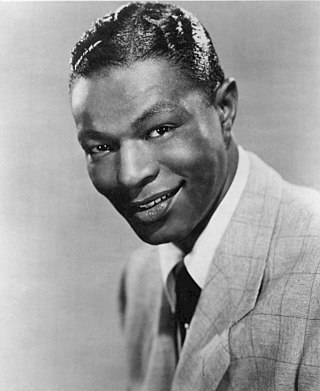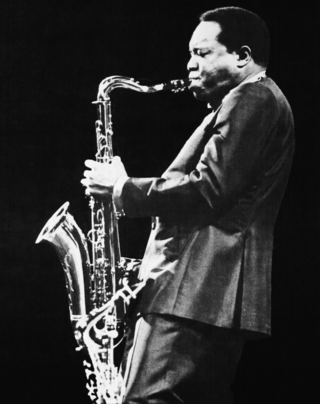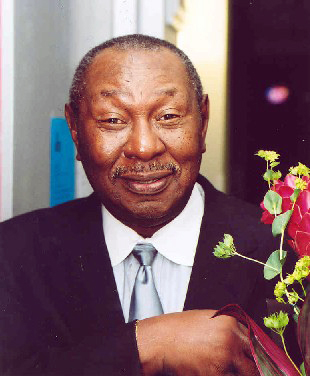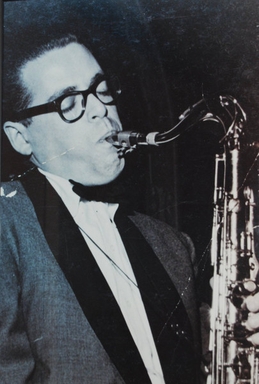
Clarence Wesley Prince (April 8, 1907 - 30 October 1980 [1] ) was an American jazz and R&B musician. He played the double bass.

Clarence Wesley Prince (April 8, 1907 - 30 October 1980 [1] ) was an American jazz and R&B musician. He played the double bass.
Prince was born in Pasadena, California. His father was a preacher; [2] his brother was the jazz musician Henry Prince (who played in Les Hite's band), and he was a cousin of the R&B musician Peppy Prince.
Between 1938 and 1941, he played in a trio with pianist and singer Nat King Cole and guitarist Oscar Moore. In addition, he participated in recordings by Louis Armstrong (1936) and King Perry (1946). Under his own name, he played on several tracks for Excelsior Records. [1] He participated in 29 recording sessions from 1936 to 1946. [3]
For Nat Cole in 1940, he wrote the song "Gone with the Draft" (the title is a play on the popular Hollywood film Gone with the Wind as well as an allusion to the fact that Cole escaped military service because of his flat feet). In August 1942, Prince was drafted for military service [4] In later years, he worked in the aviation industry. [5] Prince never recorded as a session leader.

Jimmie Noone was an American jazz clarinetist and bandleader. After beginning his career in New Orleans, he led Jimmie Noone's Apex Club Orchestra, a Chicago band that recorded for Vocalion and Decca. Classical composer Maurice Ravel acknowledged basing his Boléro on an improvisation by Noone. At the time of his death Noone was leading a quartet in Los Angeles and was part of an all-star band that was reviving interest in traditional New Orleans jazz in the 1940s.

Nathaniel Adams Coles, known professionally by his stage name Nat King Cole, was an American singer, jazz pianist, and actor. Cole's career as a jazz and pop vocalist started in the late 1930s and spanned almost three decades where he found success and recorded over 100 songs that became hits on the pop charts.

Curtis Ousley, known professionally as King Curtis, was an American saxophonist who played rhythm and blues, jazz, and rock and roll. A bandleader, band member, and session musician, he was also a musical director and record producer. A master of the instrument, he played tenor, alto, and soprano saxophone. He played riffs and solos on hit singles such as "Respect" by Aretha Franklin (1967), and "Yakety Yak" by The Coasters (1958) and his own "Soul Twist" (1962), "Soul Serenade" (1964), and "Memphis Soul Stew" (1967).

Eddie Harris was an American jazz musician, best known for playing tenor saxophone and for introducing the electrically amplified saxophone. He was also fluent on the electric piano and organ. His best-known compositions are "Freedom Jazz Dance", popularized by Miles Davis in 1966, and "Listen Here".
"Autumn Leaves" is the English-language version of the French song "Les Feuilles mortes" composed by Joseph Kosma in 1945. The original lyrics were written by Jacques Prévert in French, and the English lyrics were by Johnny Mercer. An instrumental recording by pianist Roger Williams was a number one best-seller in the US Billboard charts of 1955.

Lester Willis Young, nicknamed "Pres" or "Prez", was an American jazz tenor saxophonist and occasional clarinetist.
"The Christmas Song" is a classic Christmas song written in 1945 by Robert Wells and Mel Tormé.

"Smoke Gets in Your Eyes" is a show tune written by American composer Jerome Kern and lyricist Otto Harbach for the 1933 musical comedy Roberta. The song was sung in the Broadway show by Tamara Drasin. It was first recorded by Gertrude Niesen, with orchestral direction from Ray Sinatra, Frank Sinatra's second cousin, on October 13, 1933. Niesen's recording of the song was released by Victor, with in the B-side "Jealousy", a song featuring Isham Jones and his Orchestra. The line "When your heart's on fire, smoke gets in your eyes" apparently comes from a Russian proverb.

Claude "Fiddler" Williams was an American jazz violinist and guitarist who recorded and performed into his 90s. He was the first guitarist to record with Count Basie and the first musician to be inducted into the Oklahoma Jazz Hall of Fame.

"Somebody Loves Me" is a popular song, with music written by George Gershwin, and lyrics by Ballard MacDonald and Buddy DeSylva. The song was published in 1924 and featured in George White's Scandals of 1924.
Plas John Johnson Jr. is an American soul-jazz and hard bop tenor saxophonist, probably most widely known as the tenor saxophone soloist on Henry Mancini’s "The Pink Panther Theme". He also performs on alto and baritone sax as well as various flutes and clarinets.
Belford Cabell "Sinky" Hendricks was an American composer, pianist, arranger, conductor and record producer. He used a variety of names, including Belford Hendricks, Belford Cabell Hendricks, Belford Clifford Hendricks, Sinky Hendricks, and Bill Henry.

Lionel Frederick Cole was an American jazz singer and pianist whose recording career spanned almost 70 years. He was the brother of musicians Nat King Cole, Eddie Cole, and Ike Cole, father of Lionel Cole, and uncle of Natalie Cole and Carole Cole.
George Sylvester "Red" Callender was an American string bass and tuba player. He is perhaps best known as a jazz musician, but worked with an array of pop, rock and vocal acts as a member of The Wrecking Crew, a group of first-call session musicians in Los Angeles. Callender also co-wrote the 1959 top-10 hit "Primrose Lane".
"Honeysuckle Rose" is a 1929 song composed by Thomas "Fats" Waller with lyrics by Andy Razaf. It was introduced in the 1929 Off-Broadway revue "Load of Coal" at Connie's Inn as a soft-shoe dance number. Waller's 1934 recording was inducted into the Grammy Hall of Fame in 1999.
"Mona Lisa" is a popular song written by Ray Evans and Jay Livingston for the Paramount Pictures film Captain Carey, U.S.A. (1949), in which it was performed by Sergio de Karlo and a recurrent accordion motif. The title and lyrics refer to the renaissance portrait Mona Lisa painted by Leonardo da Vinci. The song won the Academy Award for Best Original Song in 1950.
Mortimer Gerald Corb was an American jazz double-bassist.

Carlos Vidal Bolado (1914–1996), also known as "Vidal Bolado", was a Cuban conga drummer and an original member of Machito and his Afro-Cubans. Vidal holds the double distinction of being the first to record authentic folkloric Cuban rumba and the first to play congas in Latin jazz.
William A. Valentine, also known as Billy Valentine and Billy Vee, is an American blues, R&B and jazz pianist and singer.

Stanley "Buzz" Brauner was an American jazz instrumentalist and New York City studio musician who played saxophone, flute, oboe, English horn, clarinet, recorder, and many other woodwind instruments. Born in Brooklyn, New York in 1930, he toured the United States from 1945 to 1959 with bandleaders including Tommy and Jimmy Dorsey, Art Mooney, Ted Lewis, Richard Maltby, Buddy Morrow, and Les Elgart, except for a brief service in the U.S. Army from 1954 to 1956.